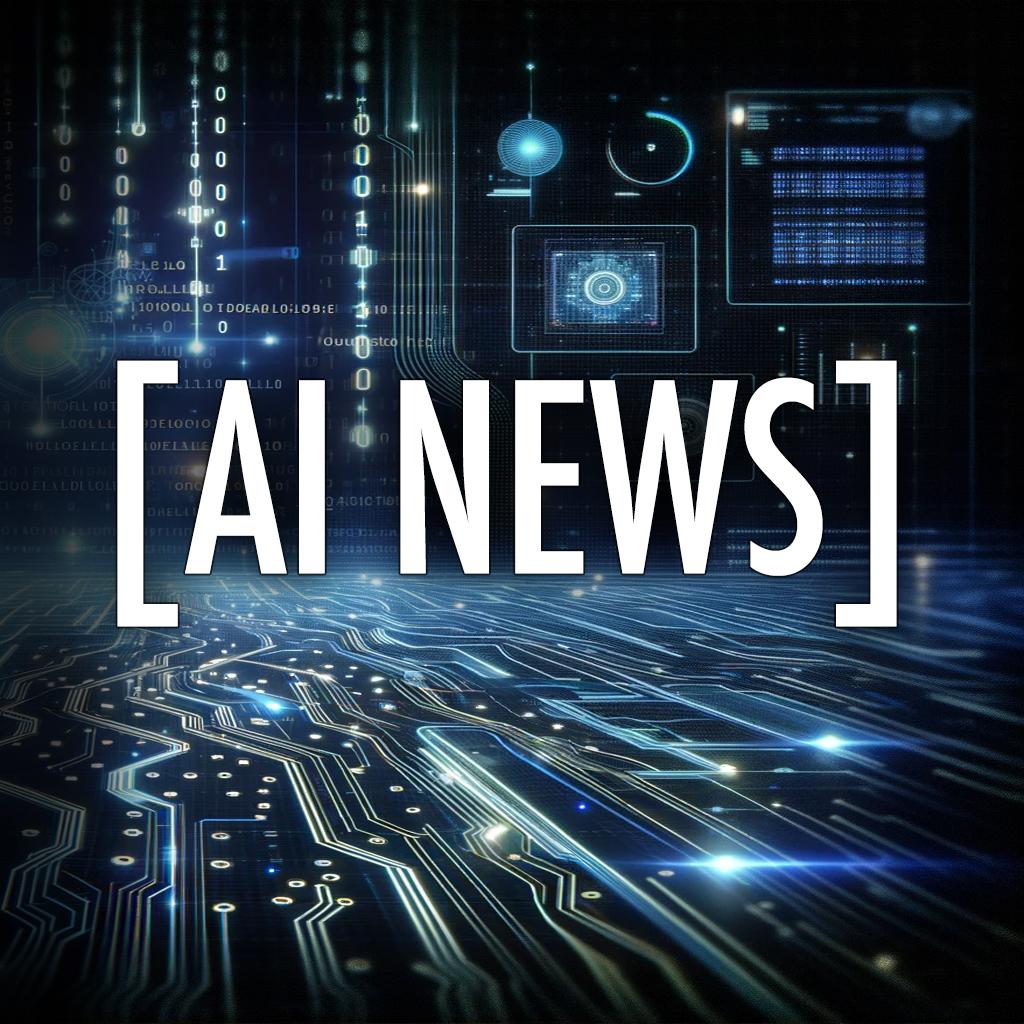In an era where technology is reimagining the fabric of our daily lives, artificial intelligence stands at the forefront of this revolution, reshaping industries, economies, and personal experiences at an unprecedented pace. Welcome to “Unlocking Tomorrow,” where we embark on an enlightening journey through the latest AI news that is not only transforming how we live and work but also challenging our perceptions of what is possible. From groundbreaking advancements in machine learning to ethical discussions surrounding AI implementation, this article will explore the most significant developments and innovations that are not just changing the landscape of technology, but also influencing the future of humanity itself. Join us as we delve into the fascinating world of AI and uncover the stories that are driving us toward a smarter, more connected tomorrow.
# Emerging Trends in AI Technology and Their Implications
Artificial Intelligence (AI) continues to revolutionize various sectors, reshaping how we approach challenges and facilitating groundbreaking advancements. As we delve into **emerging trends in AI technology**, it’s crucial to assess not only the innovations themselves but also their implications for society, businesses, and the future of technology. This article explores several key trends that are currently dominating the AI landscape, alongside their potential ramifications.
## 1. **Enhanced Natural Language Processing (NLP)**
Natural language processing has made significant strides recently, moving from simple keyword recognition to sophisticated models that understand context, tone, and even emotional nuances. Technologies such as **OpenAI’s GPT-4** and Google’s **BERT** have set new benchmarks in language comprehension, enabling machines to interact with humans more naturally.
– **Implications:**
– **Customer Service Automation:** Businesses can deploy advanced chatbots capable of handling complex inquiries, providing personalized responses, and reducing the need for human intervention.
– **Content Generation:** From automated news reports to creative writing, enhanced NLP can significantly streamline content creation, allowing businesses to generate large volumes of text with minimal resources.
## 2. **AI in Healthcare**
AI’s integration into healthcare is proving transformative, particularly in data analysis and predictive analytics. Machine learning algorithms are enhancing diagnostic accuracy, predicting patient outcomes, and personalizing treatment plans.
– **Implications:**
– **Improved Patient Care:** By analyzing vast amounts of medical data, AI can identify potential health risks and recommend proactive measures, thereby improving overall patient outcomes.
– **Cost Reduction:** Automating routine tasks such as data entry and diagnostics can lead to significant cost savings for healthcare providers, allowing them to reallocate resources toward direct patient care.
## 3. **AI-Driven Automation in Industries**
The trend towards **automation driven by AI technologies** is reshaping industries ranging from manufacturing to logistics. Robotics, powered by machine learning algorithms, are optimizing workflows and enhancing efficiency.
– **Implications:**
– **Job Displacement vs. Job Creation:** While there is concern regarding job loss due to automation, it is essential to consider that new roles in AI management, programming, and oversight are emerging.
– **Increased Productivity:** With AI managing repetitive tasks, human employees can focus on more strategic initiatives, fostering innovation and collaboration.
## 4. **Greater Emphasis on AI Ethics**
As AI systems increasingly influence personal decisions, their ethical implications are under scrutiny. Issues surrounding bias in algorithms and data privacy have sparked lively debates among technologists, ethicists, and regulators.
– **Implications:**
– **Regulatory Frameworks:** The rise of AI technology calls for robust regulatory frameworks to ensure accountability and transparency in AI applications.
– **Social Responsibility:** Companies are held to a higher standard regarding their AI practices, fostering a culture of ethical responsibility that prioritizes fairness and inclusivity.
## 5. **AI and Sustainability**
The environmental impact of technology is a growing concern, and AI is paving the way for more sustainable practices. From optimizing energy usage to enhancing supply chain efficiencies, AI can contribute significantly to sustainability efforts.
– **Implications:**
– **Resource Management:** AI facilitates better management of resources, leading to reduced waste and improved conservation practices.
– **Combatting Climate Change:** By analyzing vast datasets and modeling scenarios, AI can help scientists develop effective strategies to mitigate the impacts of climate change.
## **Key Takeaways**
– **Natural Language Processing** is advancing, enhancing human-machine interaction.
– **AI in healthcare** is leading to enhanced patient care through improved diagnostics and predictive analytics.
– **Automation** is reshaping industries, bringing both challenges and new opportunities.
– **Ethical considerations** are increasingly important in AI development, urging a focus on fairness and transparency.
– AI possesses the potential to drive **sustainability efforts**, reflecting a growing awareness of environmental impact.
As we reflect on these emerging trends, it becomes clear that AI technology is not merely a tool; it is a transformative force with far-reaching implications. In the following section, we will explore **key insights from recent AI research and reports**, delving deeper into the findings shaping our understanding of this dynamic field. # Key Insights from Recent AI Research and Reports
In the rapidly evolving landscape of artificial intelligence, staying updated on the latest findings from research and industry reports is vital for understanding the trajectory of this transformative technology. Various studies and analyses shed light on both the capabilities and pitfalls of AI, outlining trends that are shaping its application across sectors. Below, we delve into some **key insights** generated from the latest AI research and reports, providing a comprehensive overview of current developments.
## Recent Breakthroughs in AI Research
1. **Advancements in Natural Language Processing**
Recent studies have showcased **prestigious models such as GPT-4 and BERT** that have enhanced human-like comprehension and interaction abilities in machines. Researchers are exploring new architectures that enable better context understanding, allowing AI to generate more relevant and coherent responses.
2. **AI in Healthcare**
AI is making significant inroads in healthcare diagnostics and treatment planning. A recent report highlighted the role of **machine learning algorithms** in predicting diseases based on patient histories and genetic markers. According to a study published in the *Journal of Medical Internet Research*, AI applications have the potential to increase diagnostic accuracy by up to 30%, significantly impacting patient outcomes.
3. **Ethics and Bias Mitigation**
As AI systems become more integrated into decision-making processes, concerns surrounding **ethical implications** and inherent bias in algorithms have come to the forefront. Research initiatives are increasingly focusing on **bias detection and correction**, with studies indicating that diverse training datasets can help reduce bias, promoting fairness in AI applications.
4. **AI and Climate Change**
A powerful report by the **World Economic Forum** posits that AI can be a formidable tool in combating climate change. By optimizing energy consumption and enhancing climate modeling, AI technologies are showing promise in driving sustainability forward. Consequently, organizations are beginning to leverage AI for predictive analytics to prepare better for climate-related events.
5. **AI in Business Optimization**
AI applications in business are on the rise. Companies are deploying **predictive analytics** to refine supply chain management and enhance customer service. According to a McKinsey report, businesses implementing AI strategies witness a 20% increase in productivity, underscoring its potential in driving operational efficiency.
### Emerging Trends in AI Research
– **Federated Learning**: This innovative approach enables machine learning models to be trained without centralized data, preserving privacy and enabling richer data collaboration across different institutions.
– **Explainable AI (XAI)**: With the demand for transparency in AI systems escalating, research is increasingly focused on developing models that provide interpretable outcomes, allowing users to understand and trust AI-driven decisions.
– **Neurosymbolic AI**: Bridging the gap between neural networks and symbolic reasoning, this research area aims to empower AI systems with the **ability to reason logically** while learning from data—an important step towards achieving human-like cognition.
### Key Takeaways
– **AI is impacted by cutting-edge research** as advancements in natural language processing, healthcare applications, and climate change solutions continue to unfold.
– **Ethical considerations remain critical** as researchers seek robust solutions to mitigate bias and enhance transparency in AI systems.
– **Organizations leveraging AI** can expect substantial gains in productivity and efficacy, particularly within fields like business optimization and data analytics.
## FAQs
**Q1: What are the main areas of AI research focus today?**
**A1:** The main areas include Natural Language Processing, healthcare applications, bias mitigation, climate change initiatives, and business optimization.
**Q2: How does AI help in healthcare?**
**A2:** AI aids in analyzing medical records, predicting diseases, and improving diagnostic accuracy, which can enhance patient care and treatment strategies.
**Q3: What are the implications of ethical concerns in AI?**
**A3:** Ethical concerns lead to critical discussions regarding bias in algorithms, privacy issues, and the need for explainability in AI decision-making processes.
The insights gathered from recent AI research and reports not only illuminate the advancements within the sector but also highlight the challenges that come with such rapid progress. As industries learn to navigate the complexities and potentialities of AI, the influence it wields will continue to expand.
In the next section, we will explore **The Influence of AI on Various Industries: A Comprehensive Overview**, examining how AI is reshaping the dynamics across different sectors and its broader socio-economic implications. # The Influence of AI on Various Industries: A Comprehensive Overview
Artificial Intelligence (AI) has swiftly transitioned from a futuristic concept into a driving force within various industries. Its profound effects are reshaping business models, enhancing productivity, and redefining operational efficiencies. Below, we explore how AI has permeated key sectors, showcasing its transformative potential and the innovative applications that are enhancing our daily lives.
## 1. **Healthcare**
AI is revolutionizing **healthcare** through predictive analytics, personalized treatment plans, and improved patient outcomes. Here are some notable applications:
– **Medical Imaging**: AI algorithms enhance image interpretation, aiding radiologists in diagnosing conditions like tumors or fractures with higher accuracy.
– **Drug Discovery**: Machine learning models analyze vast datasets to identify potential drug candidates faster and cheaper than traditional methods.
– **Virtual Health Assistants**: Chatbots and AI-driven interfaces provide immediate access to medical information, schedule appointments, and offer basic healthcare advice.
These innovations not only foster enhanced patient care but also reduce costs, positioning healthcare institutions to be more efficient and responsive.
## 2. **Finance**
In the financial sector, AI plays a crucial role in risk assessment, fraud detection, and algorithmic trading. Key applications include:
– **Fraud Detection**: AI systems continuously analyze transactions and flag anomalies that could indicate fraudulent behavior, drastically reducing financial losses.
– **Investment Strategies**: Robo-advisors use AI to curate investment portfolios based on individual preferences and market trends, democratizing access to wealth management.
– **Customer Service**: AI-powered chatbots streamline customer interactions, provide technical support, and enhance user experiences across platforms.
These advancements are shifting the highly regulated financial landscape, making processes more efficient and secure.
## 3. **Retail**
The retail industry is leveraging AI to enhance customer experiences and optimize supply chains. Key trends include:
– **Personalization**: AI algorithms analyze consumer behavior to deliver personalized recommendations, significantly boosting conversion rates and customer satisfaction.
– **Inventory Management**: Advanced forecasting tools enable retailers to anticipate demand fluctuations, reducing both overstock and stockouts.
– **Automated Checkout**: AI-driven checkout technologies expedite the shopping experience, allowing customers to purchase items without traditional cashiers, thus improving operational efficiency.
As retailers continue to embrace these AI-enhanced practices, they unlock new pathways to revenue and customer loyalty.
## 4. **Manufacturing**
AI’s influence in the manufacturing sector is profound, affecting everything from supply chain logistics to equipment maintenance. Key advancements include:
– **Predictive Maintenance**: AI systems analyze machinery performance data to predict failures before they occur, minimizing downtime and repair costs.
– **Quality Control**: Computer vision technologies enable real-time quality inspections, ensuring products meet rigorous standards before reaching the market.
– **Supply Chain Optimization**: Machine learning models enhance inventory control and streamline distribution logistics, ultimately improving delivery times and efficiency.
Such applications significantly drive productivity and cost efficiency, thus giving manufacturers a competitive edge.
## 5. **Transportation**
The transportation industry is undergoing a massive transformation thanks to AI, particularly in:
– **Autonomous Vehicles**: Companies are increasingly testing self-driving cars and trucks, aimed at reducing accidents and improving traffic flow.
– **Traffic Management**: AI systems analyze real-time data to optimize traffic signals, thereby minimizing congestion and enhancing travel efficiency.
– **Fleet Management**: Transportation companies leverage AI for route optimization, predictive maintenance, and fuel efficiency tracking, ensuring cost-effective operations.
These innovations are set to redefine mobility, offering safer and more efficient transportation options for everyday users.
## 6. **Telecommunications**
AI is streamlining operations and enhancing customer experiences in telecommunications through applications such as:
– **Network Optimization**: AI algorithms manage data traffic dynamically, ensuring optimal performance and quality of service.
– **Automated Customer Interaction**: Intelligent virtual assistants handle customer service queries efficiently, reducing wait times and improving satisfaction levels.
– **Predictive Analytics**: Companies employ AI to analyze user behavior patterns, predict churn, and devise retention strategies.
As telecommunications infrastructure grows more complex, AI’s role in managing these challenges becomes increasingly essential.
## Key Takeaways
– AI is transforming industries by enhancing **efficiency**, **accuracy**, and **customer engagement**.
– The adaptations in **healthcare**, **finance**, **retail**, **manufacturing**, **transportation**, and **telecommunications** illustrate AI’s vast potential.
– Businesses integrating AI can leverage significant advantages over competitors, driving innovation and sustainability.
The pervasive influence of AI across diverse sectors foreshadows a future where intelligent technologies become integral to operational success. As we move forward, the exploration of **ethical considerations and challenges in AI development** will be crucial to ensure the benefits of AI are maximized while mitigating any potential drawbacks.
Stay tuned for an insightful discussion on **ethical considerations and challenges in AI development**, where we will delve into the critical aspects of responsibly integrating AI into our society. # Ethical Considerations and Challenges in AI Development
The rapid advancement of **artificial intelligence** (AI) has sparked crucial discussions surrounding the ethical considerations and challenges that accompany its development. While this technology promises remarkable benefits across various sectors, such as healthcare, education, and finance, it also brings forth significant ethical dilemmas that need vigilant attention. As AI systems become increasingly integrated into everyday life, understanding these ethical aspects is imperative to ensure their responsible use.
## Key Ethical Challenges in AI
1. **Bias and Fairness**
One of the most pressing ethical concerns in AI development is the presence of **bias** within algorithms. AI systems are trained on vast datasets that reflect existing societal biases, leading to perpetuation of discrimination. This can result in unfair treatment in domains like hiring processes, law enforcement, and loan approvals. For example:
– **Facial recognition systems** have been criticized for demonstrating racial bias, with inaccuracies in identifying individuals from minority racial or ethnic groups.
– **Hiring algorithms** may favor certain demographics if trained on biased historical data, which can exacerbate inequalities in the job market.
2. **Transparency and Accountability**
The **black-box nature** of many AI models—particularly deep learning systems—complicates the understanding of how decisions are made. As a result, it raises serious questions regarding accountability. When an AI system makes a mistake or leads to harmful outcomes:
– Who takes responsibility for its actions?
– How can individuals understand the reasoning behind these automated decisions?
Enhancing transparency is crucial in building public trust and ensuring that AI systems are used ethically.
3. **Privacy Concerns**
The **collection and processing of personal data** is intrinsic to AI technology. From healthcare applications that analyze sensitive patient data to social media platforms that leverage user-generated content, privacy is often compromised. The ethical implications include:
– The risk of surveillance and misuse of personal information.
– The challenge of ensuring informed consent from users regarding data usage.
4. **Autonomy and Manipulation**
As AI systems gain capabilities in influencing human behavior—such as recommender systems that tailor content or advertisements—concerns emerge regarding manipulation and autonomy. Ethical dilemmas arise when AI:
– Unduly influences decision-making processes, potentially leading to addiction, misinformation, or other adverse effects.
– Encroaches on personal freedoms by micro-targeting political ads, posing challenges for democratic processes.
## Strategies for Ethical AI Development
To navigate these ethical challenges, organizations and developers should adopt several strategies:
### Establishing Ethical Guidelines
– Implementing comprehensive ethical frameworks can help guide AI development. Collaborative initiatives, such as the **Ethics Guidelines for Trustworthy AI** by the European Commission, serve as valuable models.
### Promoting Diversity in AI Teams
– Diverse teams are better equipped to identify potential biases and other ethical issues in AI systems. Incorporating a range of perspectives helps ensure that multiple facets of the issue are considered.
### Regular Audits and Regulation
– Conducting regular audits of AI algorithms and their outcomes can help identify and rectify biases or unfair practices. Advocating for **government regulations on AI development** could also promote adherence to ethical standards.
### Emphasizing Data Privacy
– Utilizing privacy-preserving methodologies, such as **differential privacy**, can mitigate privacy risks while allowing for data analysis. Furthermore, becoming compliant with data protection regulations, such as the **GDPR**, is essential for responsible data usage.
### Fostering Public Engagement
– Encouraging dialogues with stakeholders, including the public, can shed light on societal views regarding AI ethics. Such engagement is crucial for developing technologies that reflect societal values and prioritize the well-being of all.
## FAQs
### What role do ethics play in AI development?
Ethics in AI development guide how technologies are designed and implemented, ensuring that they are fair, accountable, and responsible. They help address issues such as bias, transparency, privacy, and the potential for manipulation.
### How can AI bias be addressed?
AI bias can be tackled through diverse training datasets, regular audits of algorithms for fairness, and by ensuring diverse teams of developers contribute to the design of AI systems.
### Why is transparency important in AI?
Transparency fosters trust between AI systems and their users. It allows individuals to understand how decisions are made and ensures that accountability can be established for errors or biases.
## Key Takeaways
– **Bias and fairness** are critical concerns in AI, necessitating vigilant monitoring.
– **Transparency and accountability** help foster trust and responsible AI use.
– **Privacy considerations** must not be overlooked in AI development.
– **Public engagement** and diverse development teams are essential for ethical AI practices.
Moving forward, the discourse on ethical considerations in AI development will continue to evolve. For those interested in further understanding the landscape of AI, the next section will explore valuable resources to stay updated on the latest innovations and advancements in artificial intelligence. # Resources for Staying Updated on AI Innovations and News
In an era where **_artificial intelligence_** (AI) is rapidly reshaping industries, technologies, and daily life, staying informed on the latest developments is crucial for professionals and enthusiasts alike. The sheer volume of information available on this subject can be overwhelming. Therefore, finding reliable resources to keep abreast of AI innovations and news becomes imperative. This article outlines a variety of platforms, ranging from online publications and social media to podcasts and newsletters, ensuring that you remain at the forefront of AI advancements.
## Online News Outlets
### 1. **Artificial Intelligence News**
The **Artificial Intelligence News** website serves as a hub for the latest updates, trends, and analyses in the AI ecosystem. Their articles cover technological advancements, industry news, and research insights, making it a valuable resource for anyone looking to deepen their understanding of AI.
– **Website:** [Artificial Intelligence News](https://www.artificialintelligence-news.com/)
– **Key Features:**
– Comprehensive reports from industry experts.
– Up-to-date information on AI technology trends.
– In-depth research summaries.
### 2. **Wired**
Renowned for its stylishly written content, **WIRED** makes complex technological topics accessible. Its dedicated section on artificial intelligence features articles that discuss recent breakthroughs, ethical concerns, and the societal impact of AI.
– **Website:** [WIRED – Artificial Intelligence](https://www.wired.com/tag/artificial-intelligence/)
– **Key Features:**
– Engaging narratives about current AI applications.
– Insights into ethical considerations surrounding AI deployment.
– Coverage of AI-related events and innovations.
### 3. **TechCrunch**
As a leading technology news website, **TechCrunch** has dedicated itself to the world of AI through insightful articles that delve into both technology and the businesses behind it. This site captures the essence of what’s happening in the AI landscape, providing readers with all necessary updates.
– **Website:** [TechCrunch AI](https://techcrunch.com/category/artificial-intelligence/)
– **Key Features:**
– Articles focused on startups and AI entrepreneurs.
– Reviews of new AI products and tools.
– Analysis of market trends and investment opportunities.
## Social Media and Online Communities
### 4. **LinkedIn**
On **LinkedIn**, industry professionals share their insights and latest findings related to artificial intelligence. Following leading figures in AI, tech companies, and research institutions can significantly enhance your knowledge.
– **Key Benefits:**
– Real-time industry updates from professionals.
– Networking opportunities with AI experts.
– Capability to engage in discussions on recent trends.
### 5. **Reddit**
Subreddits like **r/ArtificialIntelligence** and **r/learnmachinelearning** are vibrant communities where users share various resources, articles, and discussions surrounding AI. These forums can be a goldmine for real-time news and community support in your learning journey.
– **How to Use:**
– Stay engaged in relevant threads to access trending news.
– Participate in discussions to gain diverse perspectives.
– Bookmark useful posts for future reference.
## Podcasts and Webinars
### 6. **AI Alignment Podcast**
**AI Alignment Podcast** delves into the intricacies of AI, exploring topics such as machine learning, ethical implications, and future trends. Listening to these episodes can enhance your understanding of current debates in the field.
– **Key Features:**
– In-depth interviews with thought leaders.
– Discussions on theoretical and practical aspects of AI.
– Accessibility through various streaming platforms.
### 7. **The AI Alignment Podcast on Youtube**
A visual companion to the aforementioned podcast, **The AI Alignment** YouTube channel provides engaging discussions and webinars featuring AI experts. This platform also hosts various lectures and talks on the latest trends in AI.
– **Advantages of YouTube:**
– Visual content that enhances understanding.
– Interactive Q&A sessions during live events.
– Easy access to past webinars for further learning.
## Newsletters
### 8. **The Batch from Andrew Ng**
**The Batch** is a weekly newsletter that offers insights tailored for AI professionals by Andrew Ng, a prominent figure in AI education and research. Resources like this can keep your inbox filled with valuable insights.
– **Benefits:**
– Curated news from reputable sources.
– Summaries of recent developments in AI.
– Relevant articles and recommended resources.
## Key Takeaways
– To stay informed about **_AI innovations_** and news, leverage a variety of platforms including online news outlets, social media, podcasts, and newsletters.
– Following reputable sources such as **Artificial Intelligence News**, **WIRED**, and **TechCrunch** provides a strong foundation for understanding AI’s landscape.
– Engaging with communities on **LinkedIn** and **Reddit** can expose you to diverse perspectives and real-time updates.
– Subscribing to newsletters like **The Batch** ensures a consistent flow of curated information directly to your inbox.
By utilizing these resources, you can effectively navigate the intricacies of **artificial intelligence** and remain informed of the latest trends and debates shaping the field.
As we move forward, our next section will delve into the **_ethical considerations and challenges in AI development_**, spotlighting the responsibilities that come with advancing this powerful technology.
As we navigate the ever-evolving landscape of artificial intelligence, it’s clear that the innovations shaping our world are only just beginning to unfold. From groundbreaking advancements in language processing to transformative applications in healthcare, AI is unlocking unprecedented opportunities and addressing some of society’s most pressing challenges. As we keep a close eye on these developments, it’s important to stay informed and engaged, as the implications of these advancements will undoubtedly affect our daily lives and the future we envision. Join us in our journey to explore the influence of AI, and let’s embrace the promise of tomorrow together!



